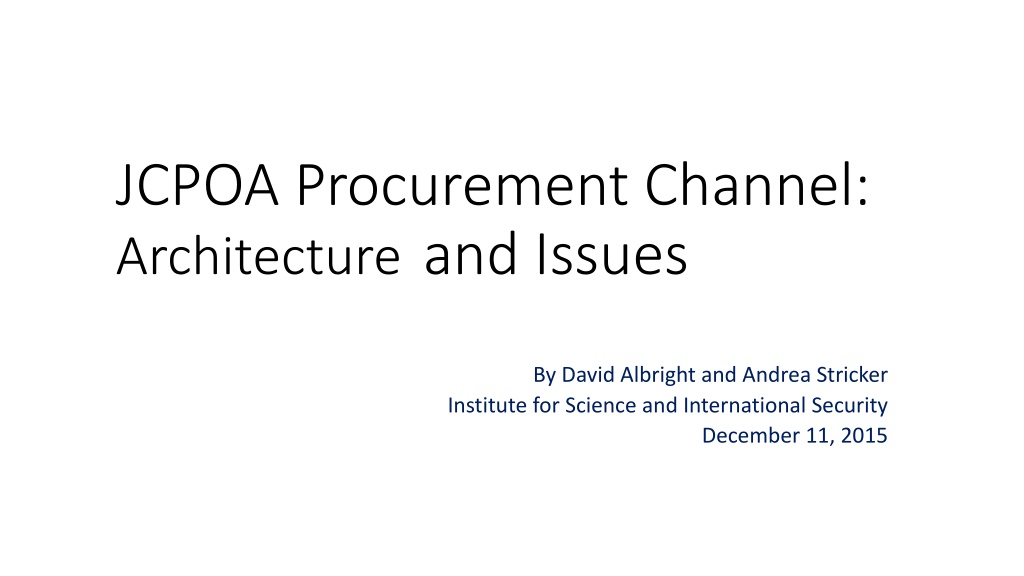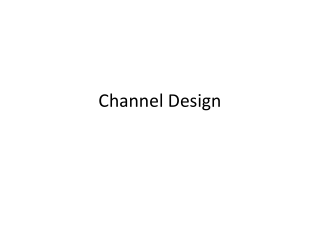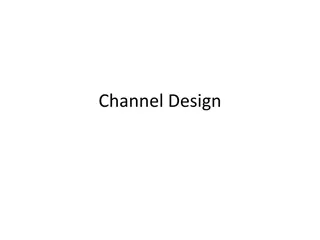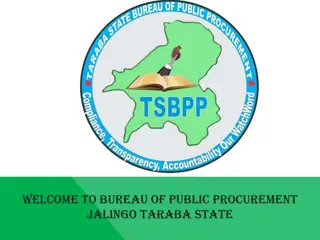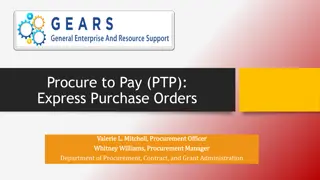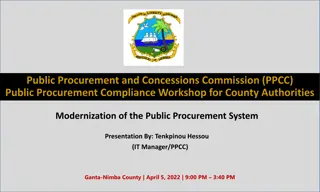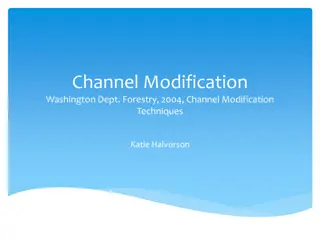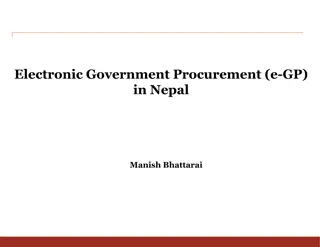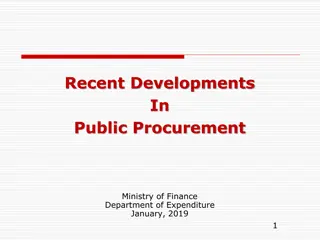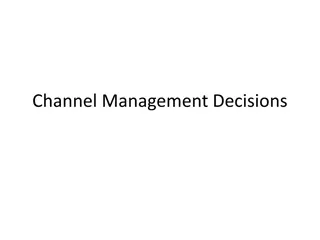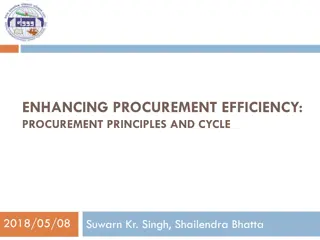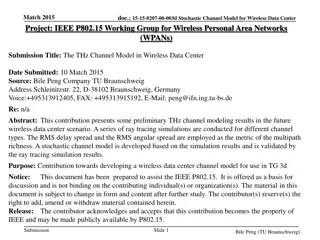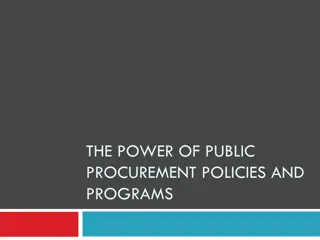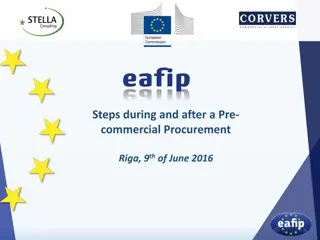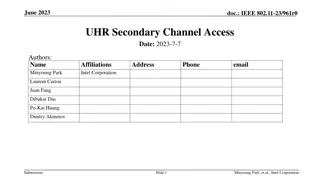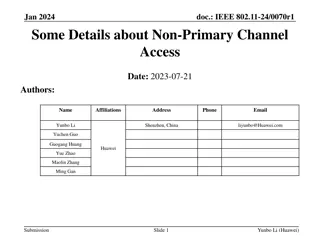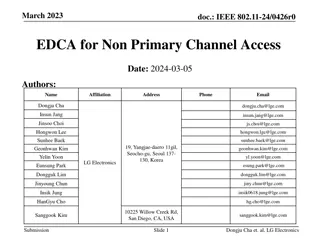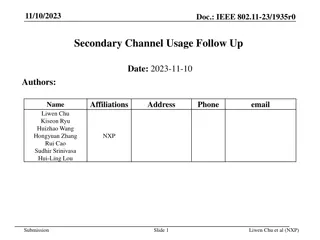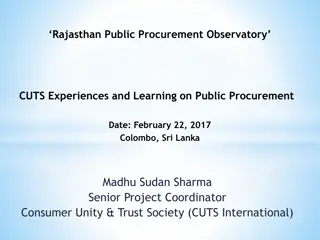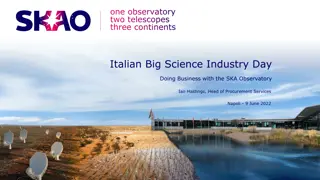Understanding the JCPOA Procurement Channel: Architecture and Issues
The JCPOA Procurement Channel provides a framework for states to engage in proliferation-sensitive sales to Iran, regulating the flow of goods for nuclear programs. This international entity aims to enhance transparency and prevent violations of the JCPOA. Key provisions include the establishment of the Procurement Working Group overseen by the Joint Commission, with a detailed procedure for approval of sales to Iran. UNSCR 2231 plays a crucial role in making these provisions legally binding.
Download Presentation

Please find below an Image/Link to download the presentation.
The content on the website is provided AS IS for your information and personal use only. It may not be sold, licensed, or shared on other websites without obtaining consent from the author. Download presentation by click this link. If you encounter any issues during the download, it is possible that the publisher has removed the file from their server.
E N D
Presentation Transcript
JCPOA Procurement Channel: Architecture and Issues By David Albright and Andrea Stricker Institute for Science and International Security December 11, 2015
Intro to Nuclear Procurement Channel The Joint Comprehensive Plan of Action (JCPOA) lays out a new international entity and a set of procedures for states to make proliferation-sensitive sales to Iran via a Procurement Channel. Purpose: To regulate the flow of goods to Iran s authorized nuclear programs and non-nuclear civil end users. It seeks to deny Iran opportunities, or at least help expose any efforts, to violate the JCPOA and increase the transparency of Iran s nuclear programs. This channel is one of the most complex provisions in the JCPOA, and it will need to function effectively, as it will be in place for the first ten years of the agreement. 3
Intro to Nuclear Procurement Channel, cont Procurement channel was made legally binding by United Nations Security Council resolution 2231 which endorses the JCPOA overall, makes the provisions binding on all members states (not only JCPOA parties), and subjects these provisions to oversight by the Security Council. UNSCR 2231 replaces current UN sanctions resolutions on Iran at Implementation Day of the deal (in 2016), when the channel will also go into effect. Iran Sanctions Committee and Panel of Experts will cease to exist (at insistence of Iran); UNSC will have responsibility of oversight. 4
Intro to Nuclear Procurement Channel, cont UNSCR 2231 effectively leaves in place missile and military sanctions on Iran for eight and five years, respectively, requiring case-by-case approval by UNSC (unspoken assumption will ensure veto of requests). 5
Key Provisions: Oversight and Procedure Creates a regulatory body called the Procurement Working Group (PWG) overseen by the JCPOA s Joint Commission. For a range of goods, the supplier must go to own government for approval and the government must then send the request to the PWG and the UN Security Council. PWG membership is one voting member each of E3+3 and Iran; EU High Rep. is the Coordinator. Meets every three weeks. PWG has 20 working days to make decisions regarding whether to disapprove the sale of direct-use, nuclear-related dual-use, or certain dual-use goods to Iran pursuant to proposals that are submitted by UN member states. An additional 10 working days by request. If no one objects, the proposal is approved. In case of disagreement in the PWG, two members can request referral of case to Joint Commission for consensus vote. Joint Commission has 10 days to decide and UNSC must be notified of recommendation within 45 days of receipt of proposal. 6
Regulation of Imports The PWG will decide on: - UNSCR 2231: The supply, sale or transfer directly or indirectly from their territories, or by their nationals or using their flag vessels or aircraft to, or for the use in or benefit of, Iran, and whether or not originating in their territories, of all items, materials, equipment, goods and technology set out in INFCIRC/254/Rev.12/Part 1 and INFCIRC/254/Rev.9/Part 2 (or the most recent versions of these documents, as updated by the Security Council), as well as any further items if the State determines that they could contribute to reprocessing or enrichment-related or heavy water-related activities inconsistent with the JCPOA. Catch-all Provision perhaps more broad in JCPOA: - JCPOA states on Part 1 goods: if the end-use will be for Iran's nuclear programme set out in this JCPOA or other non-nuclear civilian end-use, - JCPOA states on Part 2 goods: as well as any further items if the relevant State determines that they could contribute to activities inconsistent with the JCPOA. (no description of the activities) 7
Key Provisions: Regulation of Imports The PWG will decide on: - the provision to Iran of any technical assistance or training, financial assistance, investment, brokering or other services, and the transfer of financial resources or services, related to the supply, sale, transfer, manufacture or use of the items, materials, equipment, goods and technology described in subparagraph (a) above; and - acquisition by Iran of an interest in a commercial activity in another State involving uranium mining or production or use of nuclear materials and technology as listed in INFCIRC/254/Rev.12/Part 1, and such investment in territories under their jurisdiction by Iran, its nationals, and entities incorporated in Iran or subject to its jurisdiction, or by individuals or entities acting on their behalf or at their direction, or by entities owned or controlled by them. 8
Proposals Submitted to PWG Required Information in a Proposal: Supplierstate sends proposal for a sale of a direct- or dual-use Nuclear Suppliers Group (NSG)- controlled good. It goes to both PWG and copied to UNSC. Proposal must include: description of item, contact info, export license info, end-use info and location, end-use certification by Atomic Energy Org of Iran for nuclear- related goods or the appropriate governmental authority of Iran attesting the stated end-use (evidently for sales to non-nuclear civil industries). 9
Key Provisions: End Use Checks, Dispute Resolution, Reporting, Duration End-use checks: Iran must allow IAEA access to check the end use of direct-nuclear use goods and supplier states will have authority to check end use of Part II dual-use goods. Catch-all goods not addressed with regards to end use. IAEA could in course of safeguarding check dual-use goods, ostensibly in extreme cases also invoke Access provision. Dispute resolution: Ability of any JCPOA participant to refer a procurement-related activity to the Joint Commission is included under the dispute settlement mechanism Reporting to UNSC: Joint Commission will report to the UN Security Council at least every six months on the status of the Procurement Working Group s decisions and on any implementation issues. Duration: Formal duration of the Procurement Channel is ten years. At Termination Day, all restrictions will end. 10
Timeline of a Proposal Proposal sent by a state to UN Security Council & Joint Commission Coordinator Coordinator sends proposal to PWG members If nuclear end-use also, Coordinator sends proposals to the IAEA Proposal must include the supporting information as defined above PWG members must inform the Coordinator within 20 working days whether rejects Proposal approval sent to UN Security Council if: All PWG participants approve At end of 30 working days Coordinator has received no disapprovals If at end 30 working days approval not recommended, 2 participants may within 5 working days request forward to Joint Commission Which may approve by consensus within 10 working days Otherwise recommended for disapproval Participants recommending disapproval provide relevant information Coordinator informs Security Council of recommendation No later than 35 working days If goes to Joint Commission decision 45 working days Recommendation approved unless Security Council rejects in 5 working days 11
Other Iranian Commitments: Anti-Trafficking and Enrichment Related Transfers Iranian anti-trafficking commitment: UNSCR 2231 Annex IV, Section 6: Iran will not use, acquire, or seek to procure the items, materials, equipment, goods, and technology referred to in Section 6.1 of this Annex which are inconsistent with this JCPOA. Prohibition on enrichment related export and transfers: For a period of 15 years Iran will only engage, including through export of any enrichment or enrichment related equipment and technology, with any other country, or with any foreign entity in enrichment or enrichment related activities, including related research and development activities, following approval by the Joint Commission. 12
Iran remains committed to illicit procurement Iran remains committed to illicit procurement Iranian officials have repeatedly stated intention to illicitly procure for missile/military programs. Iran s civil industries and universities have been at the core of Iran s illegal procurement efforts for decades- once centers of illicit military nuclear procurement, enrichment, weaponization efforts. They certainly are practiced in the illicit procurement arts. Examples: Of course we bypass sanctions. We are proud that we bypass sanctions. --Iranian President Hassan Rouhani, August 30, 2014 implement sections of United Nations Security Council Resolution 2231 which apparently is the JCPOA s only legal backing that compromise defense and national security. --Report of Iranian Special Commission tasked with approving nuclear deal, October 4, 2015 The Islamic Republic of Iran s government has said that it does not intend to 14
Need for Vigilance over Sales to Iran Need for Vigilance over Sales to Iran Need for vigilance over Iran s procurements will remain. Will need to detect and stop illicit procurements in violation of the JCPOA, national and regional export controls, and UNSC resolution 2231. Suppliers and supplier countries will need to watch for Iran s attempt to misuse the channel or bypass it. 15
Width of the channel is broad: Width of the channel is broad: A serious challenge is the inclusion of non-nuclear civil industries as legitimate recipients of goods along with the authorized nuclear programs. As such, Iran s civil industries will have a clear motivation to connect with overseas suppliers to obtain a range of dual-use goods, including those on the Part 2 list and those considered catch-all goods by major suppliers on PWG. Many, if not most, of the proposals to the Procurement Working Group could be for Iran s non-nuclear civil industries. 16
The Challenges of a Broad Channel The Challenges of a Broad Channel Burden on suppliers and supplier states to be thorough and effective. Members of PWG will need to review proposals received from the Coordinator within 20 (or 30) days. One worrisome Iranian strategy may involve Iranian entities flooding the channel with legitimate requests, overwhelming supplier state resources, and then go outside the channel for procurements for nuclear, missile, and military goods. 17
Time is short Time is short The 20 working day rule is relatively short. Ten day extension is helpful but not much better. Workflow in each PWG member will need to be efficient and rapid in order to evaluate the proposals adequately. Queries to other states, including Iran, will need to be returned rapidly for system to work. Under what conditions should there be a presumption of denial? 18
Thwarting Iranian misuse for missile and other Thwarting Iranian misuse for missile and other military programs military programs Procurement channel could be exploited to obtain dual-use goods needed by military, missile program, or terrorist entities via universities, companies, or trading companies. The IRGC missile program, for example, could have a civilian company procure a needed good using a non-nuclear, civilian justification. Missile program could, moreover, use entities controlled by IRGC that have never been sanctioned (>1,000 exist). End use checks would need to be thorough and recurring to have any hope of ensuring non-missile use. Are such extensive end use checks planned? How to block misuse? 19
Denials of Approval at State Level Denials of Approval at State Level What happens if a state denies a supplier s request to export to Iran and then Iran reaches out to a different country with less stringent enforcement, such as China, which approves it? Are denials shared and respected? Does the PWG (via the UNSC) enforce a supplier state s denial of a sale, e.g. routinely block them as a matter of policy? How does the PWG learn of the denials, particularly by those states not in the PWG? Are states justified in interdicting such goods? Another example is Iran knows a state will deny a sale but seeks the item in a state with a weaker export control system, which either approves the sale without notifying the PWG or fails to notice the sale at all. Another state learns of the sale and informs the PWG. Does the PWG have the authority to order the state to block the sale? Can the goods be interdicted? If they are already sent to Iran before they are discovered, is there a procedure to require the return of the goods? 20
Transparency Transparency How extensive will transparency be among supplier states, the United Nations, and the IAEA? Are the proposals classified with limited circulation even within individual governments? Are the proposals and related information, including denials and authorizations, stored in a central location accessible by NSG members, other supplier states? 21
Need for Outreach and Education Need for Outreach and Education There is a great, potentially urgent, need for governmental outreach and communication with domestic companies and financial institutions about new regulations and procedures for the procurement channel; Need to ensure all UN member states are on board with regard to new restrictions and procedures; Who will conduct outreach? Is there a guide listing all legal requirements, regulations, and procedures? Who produces this guide? Need to ensure supplier company vigilance, including among subsidiaries/foreign locations, and reporting to governments on illicit or suspicious requests. On-going need to inform financial institutions of requirements, including that certain exports are approved or denied by the PWG. 22
End Use Checks End Use Checks End use checks are critical to the success of the Procurement Channel How to motivate countries to undertake end-use checks on dual- use good sales, and how to ensure they are rigorous? China realistically may not conduct them. Many others will not undertake this responsibility. How does one conduct an effective end-use check on a large quantity of a material, e.g. carbon fiber, over several years? One recommendation is to require multiple-inspection certification of the end user of goods for the good s lifetime, not tied to the sunset of the JCPOA s procurement channel. Disposal of the goods should be verified. 23
Enforcement Required Enforcement Required The procurement channel s provisions are so complicated that its success will likely depend on how well it is enforced. The reality is that many companies and countries may not enforce the procurement channel provisions. Many can be expected to be unaware of its requirements. Will China, for example, even know that entities are illegally exporting goods to Iran? These goods could include European goods originally legally exported to China with bans on retransfer. National enforcement will remain critical. Crucial to have ability to block nefarious financial transfers by financial institutions. Likely continued arrests, extraditions, and prosecutions of Iranian and non-Iranian violators. 24
JCPOA dispute resolution appears problematic JCPOA dispute resolution appears problematic As in many provisions of the JCPOA, enforcement mechanisms and dispute resolution are largely focused on major violations that could lead to the re- imposition, or snapback, of sanctions. With regard to more expected violations or disputes, the JCPOA provides little guidance regarding those violations expected to arise in implementing and operating the Procurement Channel. In practice, almost any violation or dispute should go through the JCPOA s dispute resolution mechanism, which as a first step involves sending the complaint to the Joint Commission for negotiation and hopefully resolution, followed by negotiations among Foreign Ministers and the possible convening of an advisory panel which can issue a non-binding opinion. This mechanism may unduly stress the agreement, perhaps lead to damaging the agreement. One concern is that states could be incentivized to avoid such disputes to avoid harming the JCPOA. 25
Additional Enforcement Mechanisms Additional Enforcement Mechanisms Is there a menu of options for penalizing violations without invoking JCPOA s dispute resolution mechanism? Some suggestions are: - Naming and shaming of violators by the media and NGOs; - Case-by-case re-listing of Iranian entities that violate the procurement channel; - Sanctioning of non-Iranian foreign entities that make illicit sales; - (Admittedly useful only if they care about doing business with United States/EU/partners) - Naming violating countries as destinations of diversion concern under U.S. law, subject to additional licensing restrictions; 26
Additional Enforcement Mechanisms: Additional Enforcement Mechanisms: Financial Sanctions Financial Sanctions For de-listed Iranian financial institutions involved in violations, U.S. and EU could threaten them with a range of penalties of increasing severity, from warnings to fines to total re- listing/sanctions (cut off from global financial system), the last of which would be devastating for Iranian banks eager to do new business, especially since it would be essentially permanent. Iranian banks could be held to account if they have knowledge of illicit end-use or end-user of goods. Penalties on them would send message to other countries not to do business with these banks. 27
Interdictions Interdictions What happens if an interdiction is needed, for example, of goods moving from China to Iran? One senior U.S. law enforcement official stated that interdictions would likely be rare, but he expects them to occur. 28
UNSC Oversight UNSC Oversight UNSC has oversight but how will that be exercised in practice? UN Secretariat may be entity responsible for oversight but it needs to bolster its technical competence to do so. Is a continued role possible for the UN Panel of Experts, or a non- political technical oversight group? The Panel of Experts has experience and expertise, often apolitical in judgments. 29
End of the procurement channel at Termination End of the procurement channel at Termination Day or Year 10: Day or Year 10: The procurement channel ends just as Iran is expected to begin laying the groundwork for a significant expansion of its enrichment program, at which point it is expected to begin seeking the import of large quantities of needed goods. - Absent a procurement channel, Iran could after year ten more effectively hide intentions to build up secret nuclear weapons programs. - Thus, a serious shortcoming of the JCPOA s procurement provisions is that just when oversight is most needed to effectively regulate sales to Iran s nuclear programs, namely when they are expanding, it ends. - In its place will be national monitoring and coordination to deny exports in the NSG rather than a full regulatory system, unless the Procurement Channel is somehow extended by the UN Security Council. 30
